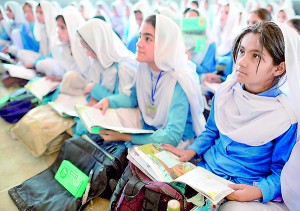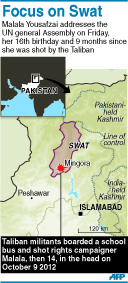Sunday Times 2
Swat girls throng to school as Malala addresses UN
View(s):MINGORA, Pakistan (AFP) -When the Pakistani Taliban shot Malala Yousafzai in the head, their message to the world was simple: girls have no right to an education and their dreams of a better future should be crushed.

Pakistani girls attend class in Mingora, the main town of Swat valley (AFP)
The attack portrayed the world’s only Muslim nuclear power in an appalling light as Western leaders and celebrities fell over themselves to turn Malala into a global icon of child rights.
Malala Yousafzai vowed Friday not to be silenced by terrorists in a powerful speech to the United Nations on her first public appearance since being shot by the Taliban.
“They thought that the bullet would silence us, but they failed,” Malala said on her 16th birthday in a presentation in which she called for books and pens to be used as weapons.
“The terrorists thought that they would change my aims and stop my ambitions, but nothing changed in my life, except this: weakness, fear and hopelessness died. Strength, power and courage was born,” she said.
Her 20 minute speech was given several standing ovations and was quickly hailed for her message of peace.
“I want education for the sons and daughters of the Taliban and all the terrorists and extremists. I do not even hate the Talib who shot me. Even if there is a gun in my hand and he stands in front of me I would not shoot him.”But Malala said “the extremists were and they are afraid of books and pens, the power of education. The power of education silenced them. They are afraid of women. Let us pick up our books and pens. They are our most powerful weapons. One child, one teacher, one pen and one book can change the world. Education is the only solution,” she said.
The passionate advocate for girls education was shot in the head by a Taliban gunman as she rode on a school bus near her home in Pakistan’s Swat Valley in October.
 She was given life-saving treatment in Britain where she now lives, but the attack has given new life to her campaign for greater educational opportunities for girls and now there are more girls than ever going to school in Malala’s home, Pakistan’s northwestern Swat valley.
She was given life-saving treatment in Britain where she now lives, but the attack has given new life to her campaign for greater educational opportunities for girls and now there are more girls than ever going to school in Malala’s home, Pakistan’s northwestern Swat valley.
In the first six months of 2013, 102,374 girls registered at primary schools in Swat — compared to a total of 96,540 during all of last year, said Dilshad Bibi, Swat district education officer.
Educationalists say the influx has less to do with Malala’s fame and more to do with a growing confidence that far from being resurgent, Taliban influence is declining in Swat.
“Many people think that Malala has nothing to do with the increase in girl students in schools,” said Erfaan Hussein Babak, head teacher of a private school in the town of Saidu Sharif.
“It is because of a general awareness among the masses that girls should also be educated,” he told AFP.
“There are many other girls who worked for education and continued their studies under the Taliban. They think that Malala was wrongly promoted by the media and was falsely hyped,” he said.
Anwar Sultana, headmistress of Government Girls High School No. 1, the oldest in Mingora, the main town in Swat, agrees.
“Many students were actually scared when the government named a college after Malala,” she said.
Last December, around 150 girls at another school protested against the renaming of their college after the injured schoolgirl, fearing it would make them a target for militants.
They tore up and stoned pictures of Malala, since nominated for the Nobel Peace prize and now being privately educated in Britain, accusing her of abandoning Pakistan.
Sultana says more girls are going to school now not because of Malala, but because people feel increasingly liberated as more time passes since the Pakistan army quashed a 2007-9 Taliban insurgency in the valley.
“Whenever you suppress something, it appears with more freedom,” Sultana told AFP, sitting on a verandah as girls in long white shirts and baggy trousers poured out of congested classrooms.
“Now more and more girls are joining schools, which means the fear is over,” Sultana said.
At Sultana’s school, there are no desks and chairs in the dark brown, grey and orange coloured classrooms. Instead the girls sit on the floor to pack a maximum number into each room.
Saeeda Rahim, 13, is one of those girls.
The Taliban stopped her and thousands of other girls from going to school between 2007 and 2009. When the army offensive came in 2009, she and her family were forced to flee for their safety.
Now, she is back at Government High School No 1. She covers her face with a white veil, wears the pink strip of a prefect — and says she takes inspiration from Malala.
“I really like her speeches. I want to continue her work, I want to appear in the media and convince parents that education is a right for their daughters,” she said.
Follow @timesonlinelk
comments powered by Disqus

